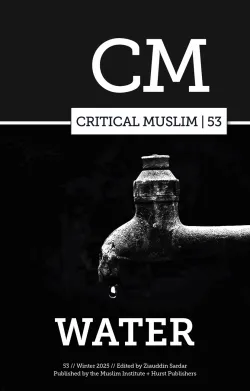Drowned World
I woke up early, with a start, suddenly evicted from a dream, as though compelled by a forgotten task or someone calling me. Villa Oneiro was situated on a small cliff just above the beach. My room had full length sliding doors and a clear view of the empty beach directly below. It was dark, the sun had not risen yet and the sea was a flickering expanse of pewter and mercury flecked with moon silver edged with an extravaganza of lace white foam. Only the wind, no one was calling. But then from a distance, I saw a figure rising out of the sea. I wrapped myself in a blanket against the early morning January chill and slid open the glass doors to the garden to take a closer look. A naked woman was rising out of the sea walking towards the shore. She was walking slowly, calm and determined, her long dark hair plastered over her face and breasts. But she must be several kilometres away surely? Although my sense of distance and scale aren’t particularly sharp, she seemed huge to me although faraway, not of a human scale at all. I watched as the sun rose behind her, a muted pearlescent light, until drizzle drove me back into my room.
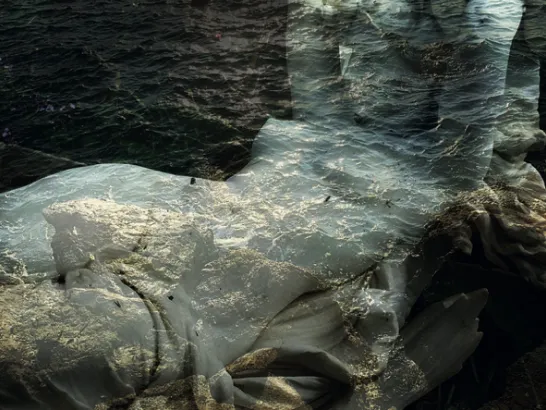
I was the first guest in the breakfast room, half an hour before breakfast service began. A lone waiter was setting up heated chafing dishes of scrambled eggs and bacon. I’m sorry, it’s too early, he informed me as he waved his hands to indicate that there were baskets of butter in tiny plastic pats and miniature jars of jam, bowls of olives and platters of halloumi and sliced tomatoes to be arranged in a suitable still life before the stage was set for breakfast. There’s a woman on the beach, I said. Please can you look? There’s something strange about her. Without even looking up he shook his head. I don’t see anything, he said. Nothing. I went to the patio. She was advancing steadily towards the shore, her monumental thighs gleaming grey, white like wet marble. By the time I returned inside the waiter had gone to be replaced by a young woman whose painted eyebrows resembled acute accents, a diacritical decoration that gave her a permanently quizzical and cross expression, even when she smiled as I approached her. There’s something outside, please come with me, I took her elaborately manicured hand and pulled her towards the patio. Her voice is high, calm, and sweet as we survey the empty beach under the faint drizzle. It is very beautiful, yes? Would you like coffee or tea? The woman on the beach had disappeared entirely. I drank my coffee and tried to forget her as I looked through the programme for the conference on literature and landscape which I was attending later that day.
My contribution to the conference was a paper called ‘Plato’s Atlantis: a Topography of Political Memory and Myth Making’. I’m not a classicist and dreaded being pulled into a discussion of the minutiae of Plato’s text that would reveal lacunae in my knowledge. My paper was a rhetorical analysis of Plato’s invention of a glorious history in order for a defeated regime to assert its present superiority. I was on a panel, ‘Liquid Landscapes of the Classical World’ with a Lithuanian literature professor from Vilnius University discussing the symbolism of the sea in the Odyssey and Dr Omar, a young Sudanese theologian based at a Dutch university, discussing the flood myth in the Epic of Gilgamesh, the Bible, and the Qur’an. Our session was scheduled in the afternoon, just before the coffee break.
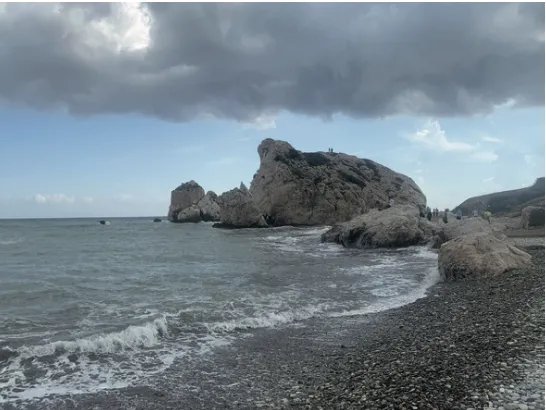
The conference was running parallel panels and we were up against ‘Landscapes of the Anthropocene’ and ‘Climate Fiction’. Perhaps these more contemporary themes were felt to be more pressing. Alternatively conference fatigue may have set in and inspired many to slip away from the proceedings to walk along the beach or take coffee at one of the cafes on the promenade. Our sparse and sleepy audience consisted of eight attendees, one of whom fled before the moderator had even finished introducing us. The weather had brightened and as I observed the sea from the presenters’ platform I too wished that I was out there rather than in this over-heated, over-lit, and rather stuffy seminar room. Whilst Professor Šimkūnaitė speculated on whether the ancient Greeks were capable of apprehending the colour blue since they didn’t have a word for it, I observed the sea sparkling in the sunlight and considered the many shades rippling in the waves and currents. I observed silver, steel, gold, azure, violet, cobalt, lavender, turquoise, ultramarine, indigo, teal, and cerulean. Doubtless an artist would have observed many more. I looked down at my pad and wrote ‘does something exist if there is no word for it?’ And as I wrote the words my body responded with an indescribable, eerie feeling that seemed to address the question and compelled me to glance up towards the sea. I both saw her and didn’t see her again, the monumental naked woman walking from the sea towards the shore. She had seemed indisputably real in the morning. This time she shimmered, something between a memory or a hallucination. On both occasions I was frightened to look her in the eye.
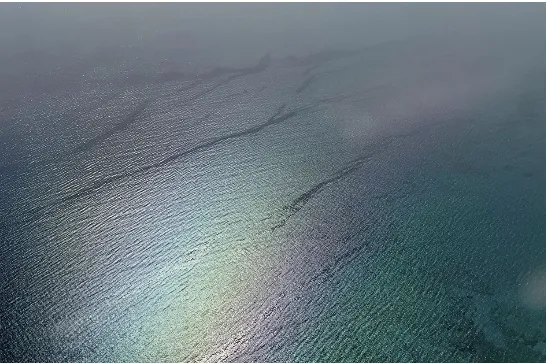
Distracted by the apparition my delivery was somewhat lacklustre, I read through my presentation dully, so I wasn’t expecting the impassioned reaction it inspired in the rotund man in the front row. All the time I was speaking he was a tense flurry of movement, shaking his head, giggling silently, cleaning his spectacles and readjusting the hairband holding up his curly white man bun. As soon as the moderator invited questions from the audience he leapt to his feet. All three speakers have come from the field of literature, he was gesticulating wildly as he spoke, for them ancient histories are only stories, are only symbolic. I, Elias Zakaria am here to say, it is real, the flood. It is real. Atlantis is real. The moderator called a swift halt to proceedings. Let’s have the post panel discussion informally over coffee, he suggested as everyone edged out of the room.
I decided to get some fresh air. As I left the conference centre to walk along the beach the white-haired Elias Zakaria was hot on my heels. Please, you must listen, it is surely a sign that you are here. It is no coincidence you are here, none at all. You have misunderstood. You literary types you think stories are symbols, metaphors. Yes, but they are real too. As he spoke he took out a thick sheaf of papers out of his shoulder bag, a variety of dog- eared pages, some typed, photocopied, and even purple carbon copies. You must read my book. I have the evidence. Sheets of paper flew across the beach. As we gathered them I suggested we discuss this over coffee.
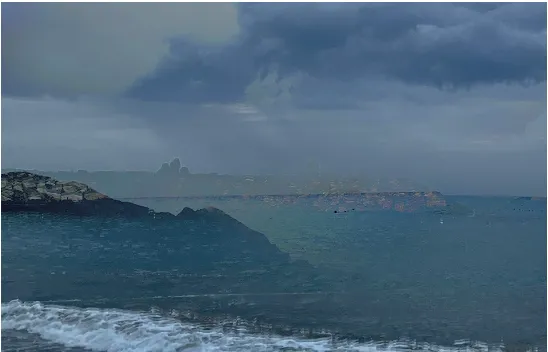
A garish mural, a cartoonish approximation of Botticelli’s Venus, dominated the decor of the Aphrodite Cafe. The sea glittered seductively. A war jet from a nearby military base roared overhead. Miley Cyrus was singing loudly about writing her name in the sand. Elias Zakaria, manic and snaggle-toothed, was talking very fast and waving his chaotic manuscript in the air. Welcome to Cyprus, a waiter said. What can I get you? My pursuer waved him away. For many years I have been researching the location of Atlantis. It is here. Yes here. Cyprus is the highest point of what was once Atlantis. But there is more, and when I heard your paper I knew you were the messenger. I cut him off at that point. No, Mr Zakaria I’m not that at all.You have misunderstood me. My field is literature, not archaeology or geology. My paper is about how we create and imagine other societies and countries so that we can present ourselves as superior and thus how these discourses are used as weapons to represent war as an ethical imperative rather than a moral crime. This is about how Plato talks about Athens and Atlantis, how with his Atlantis story he creates a poetic prose based on philosophical values. These neither presuppose nor are they bound by historical precision, that is by facts. I’m familiar with the fact that there are many theories about whether or not Atlantis actually existed and that it might be in the Mediterranean, the Black Sea, the Atlantic, the Baltic, and even the Antarctic. All of these speculations are completely irrelevant to me, they’re beyond my field of expertise.
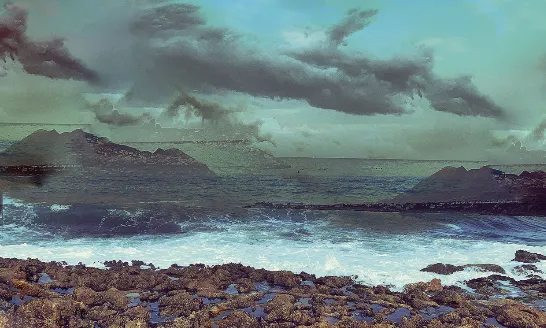
Mr Zakaria appeared chastened but he continued. I think you are the chosen messenger, the Εκλεκτός. You understand that it is about the present, that Atlantis is not just about ancient history but about the wars in the region, the genocide going on across the water, about all that is happening now. You do not believe in the truth of these events. I must leave a document with you, please read it. Perhaps then you will understand. With that he left me to watch the sea and drink a flat white alone whilst I glanced at the article. It was about the recent discovery of an ancient Egyptian papyrus scroll sixteen metres long in the necropolis of Saqqara. The translation of the scroll revealed that it was the most complete and detailed version of the myth of Astarte and the insatiable sea. I was not familiar with the myth. Yam, was a sea god in the Syrian Ugaritic pantheon, possibly a forerunner of Poseidon in the Hellenic pantheon. In the Hebrew Bible, he was the enemy of Yahweh. In this papyrus, he demanded a series of tributes and challenges of the goddess Astarte, goddess of love and war, who was to become Aphrodite to the Hellenes. Despite her success in meeting his demands he refused to be satisfied and demanded her wealth, her jewels, and her hand in marriage. The paper was long and full of erudite equivocation. I didn’t read to the end.
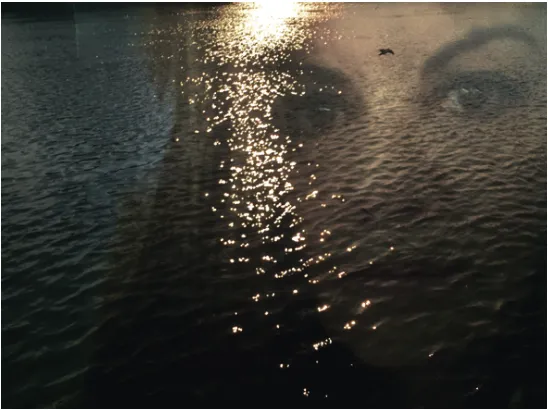
That evening at the conference dinner I was able to clear my head of this brew of myth and mystery, although the conversation was hardly more cheerful. Dr Fortinbras and Professor Maronitis were experts in anti- immigration rhetoric and the militarisation of European borders. They were discussing a recent tragedy, a refugee boat that sank a few miles off the coast and coast guards who shot at the survivors as they swam to shore. This wine dark sea is a graveyard now, sighed Dr Fortinbras. On land there are camps, detention camps that the refugees can’t leave, just a few kilometres from the tourist centres here. These are the genuine European values, mused the Professor as he scoffed a whipped feta hors d’oeuvre, the European values of institutionalised violence, Islamophobia and racism, despite all that the Lisbon treaty waffle about ‘respect for human dignity, freedom, democracy, equality, the rule of law and respect for human rights including the rights of persons belonging to minorities’.
On my return to the hotel after dinner I decided to go for a midnight walk but the hotel beach below had been roped off with police tape. Several officers were milling around shouting into walkie talkies. I retreated to the desolate little bar behind reception where the surly waiter from breakfast was wiping his glasses. He observed me with mournful eyes. I thought I saw a tear slide down his cheek. Perhaps it was a trick of the light. Do you have a cigarette? I asked him. I gave up a long time ago, but it has been a stressful day. I can roll one for you, he offered. He rolled two and we went out onto the patio and smoked in silence as we watched the cops. He rolled another for us both and as the flame from his lighter flared I saw he really was weeping. Another boat, he said. There is a terrible current in the bay. It is not safe for swimming, although the tourists do. Every year a few drown. He shrugged. That is their choice. But this was a boat of refugees. A child was lost. Dead? I asked quietly. He inhaled a lungful of smoke and shrugged. I don’t know, I heard the mother wailing, she is still on the beach. The others ran away. If they ask I tell them I see nothing. I was inside. I am a refugee myself. They may detain me, if they think I am involved.
The mother is wailing down below, her ceaseless weeping ignored by the police. Their search lights sweep the darkness. The wine-dark sea is a graveyard now, the insatiable sea. I see her momentarily in the beams penetrating the darkness. Her eyes are reflected black on black on the water. Now I know her, the vision haunting me. She is Astarte. I am Εκλεκτός, the chosen messenger between the goddess of war and the insatiable sea. I head down to the beach, pushing past the police, to the edge of the raging sea. The goddess is there she lifts me high over the waves and then down deep deep fathoms beneath where the child shines like moonlight. I grasp her in my arms, heavy and lifeless, hold her up to the goddess’ huge basalt black eyes. The child comes to life, begins to cry, clings to me. Then we are on the beach again surrounded by police, the mother running towards her child.
I make my way back to the hotel wrapped in a foil blanket where the mournful barman is waiting for me. He rolls me another cigarette. How, how did you save the child?You disappeared so suddenly. It doesn’t make sense. No, I agree, it doesn’t make sense at all.You wouldn’t believe me if I told you. I would, he says, I am from across the sea. I was born in Tyre in Lebanon, my parents were from Yafa in Palestine. All my life, none of it makes sense, and no one believes you when you tell it.

